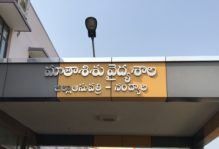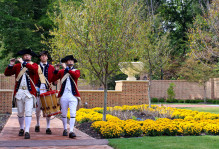Student Research on Previously Undiscovered Cloning Processes: Interview with Erin-Darby McClain
Student researcher:
Erin-Darby McClain
Lab professor:
Dr. Jon Allen
Department/topic:
Biology/Marine ecology
Participant as of:
September 2019
Fun fact from research:
“Mantis shrimp are really cool— they punch their enemies really hard and stun them. Marine invertebrates are superior to all other critters!”
Why research brought me to W&M
Before I had even begun to look at or apply to colleges, I visited William & Mary with a group from my high school physics class. Honestly, I hated it. When we came, it was dreary and grey outside and we took all these really weird routes around campus, through random construction sites and around ginormous garbage bins, because none of us knew how to get anywhere. My entire perception of W&M was just really bad—in my head, the campus was ugly, the weather was horrible, and I could never go there. Clearly, I changed my mind, but why?
That same day, we ended up touring several of the physics research labs with some of the professors. It shocked me that so many of them showed genuine excitement when telling us about their research and welcoming us into their labs. Every single one of the professors whose lab we toured told us that he or she was always looking for enthusiastic undergraduate students to participate in research. I hadn’t even realized that this was an option for an undergrad student, and I will never forget how I felt talking to those professors. Not only were they giddily telling us all about the awesome physics they were learning, but they invited us into their work with just as much excitement. I felt so welcome, and I ended up applying to the school I thought I hated. Later, after I was accepted, I came back to tour again and saw a whole new side of W&M and I fell in love with the beautiful campus. I don’t even think I saw a single garbage bin!
W&M’s focus on undergraduate participation in research is one of its best features and it’s definitely unique—out of all the colleges I applied to, it is the only one that emphasized the importance of hands-on learning and showed me genuine excitement inviting inexperienced students into it. Students can start research as early as freshman year, and research is not restricted to STEM (science, technology, engineering, and math) fields! I have friends studying in the humanities, in history or government or sociology, who are just as involved in research as my STEM friends.
Erin’s research: Brittle star cloning methods
One of my good friends, Erin-Darby McClain, is a sophomore involved in a really cool marine ecology lab. She’s studying brittle star larvae and their cloning processes, and she’s observing cloning methods of brittle stars that no one has ever recorded before.
(A brittle star essentially looks like a really ugly starfish. They’re spindly, almost like a flat spider with only five arms, and the arms are all connected to a center disk.)
Apparently, there are already several known cloning methods of brittle stars, and normally they clone by dropping a pair of arms and a piece of the center disk, which grow into an entirely new brittle star. This, in itself, is already ridiculously cool, but Erin-Darby is discovering an entirely new cloning method that biologists haven’t even documented before. Sometimes, brittle stars will break off a tiny piece of arm instead of an arm-centerpiece cluster. It was previously thought that these arm bits would just die off because they don’t have enough stem cells to regenerate.
When Erin-Darby joined her research lab, she was tasked with watching these little arm bits and changing their water a couple of times a week, in addition to her other responsibilities. She expected it would be a relatively unimportant task because no one in her lab group expected the arm bits to actually do anything. Over time, though, she started noticing the arm bits changing. By now, some of them have already regenerated into actual larvae!
Essentially, she thought she was just going to be changing water for pieces of an organism and now she has to feed the arm pieces because they grew mouths. As a non-biologist (I’m pretty sure that’s the technical term), that’s pretty much all I understand from this, but I can absolutely agree that it’s completely amazing. Since she started documenting changes, her responsibilities have increased and she is now going to be a full research student instead of a volunteer (meaning she will receive college credit for her work).
I asked her what she has learned about research from all of this, and she said that the two biggest things she’s learned are that results don’t always meet expectations, and that she wishes she could hire someone to wash dishes for her. Apparently, biology labs use a lot of dishes, but I guess that’s what the undergrads are there for! I also wanted to know what things she’s found most exciting throughout this semester, and Erin-Darby told me that she has really enjoyed taking care of living creatures. One of her responsibilities is to take care of a tank in the aquarium room, and her tank houses a huge lobster named Lobbers Jr. (He recently shed his shell! I didn’t even know lobsters shed their shells, but congrats, Lobbers Jr.!)
She stressed that the most rewarding part is the sense of accomplishment she gets from analyzing new information with real-world implications. Throughout the interview, she kept repeating that she was excited to be a part of something that was bigger than herself. The opportunity to participate in real-world research is not one that many college students get, and even though it’s more common at W&M than at many other schools, we still know and treasure the value of such a hands-on learning experience. Erin-Darby told me that through her experience in research, she’s realized just how capable she is of working hard and it’s allowed her to explore her confidence in her abilities.
“Even if you’re not 100% sure that that’s what you’re into, but you’re kind of intrigued, just dive right in!…It’s not always going to be the most rewarding experience (I got really lucky) but to be a part of something that’s bigger than yourself is just really cool.”
Read the full transcribed interview.




No comments.
Comments are currently closed. Comments are closed on all posts older than one year, and for those in our archive.